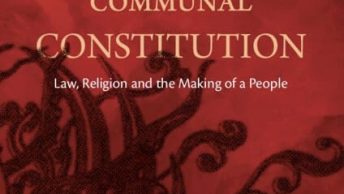[Ed Note: Over the next few days, we shall be discussing Prof. (Dr.) Upendra Baxi’s article titled “Human Rights in the Administration of Criminal Justice: The Concept of Fair Trial”, published in the Annual Journal of the National Human Rights Commission, Volume-19, 2020. This is an introduction to the paper written by our former Reporter Sahil Agarwal. The introductory post and the links for responses from commentators, including Prof. Amita Dhanda and Prof. Jinee Lokaneeta, can be found here.]
In this article, Prof. Upendra Baxi explores the central concept of fair trial as an integral aspect of human rights in the administration of criminal justice. He points out that a threshold human rights task is to convert the present administration of criminal justice (ACJ) into a ‘system of criminal justice’ (CJS). Drawing from Roscoe Pound’s notion of ‘jural postulates of civilized society’, Prof. Baxi attempts to construct the jural postulates of a civilized CJS. He then looks at some conceptual ingredients of a fair trial as laid down in a catena of judgements by the Apex Court and various High Courts, and suggests the steps towards human rights-oriented CJS reforms. He acknowledges that some of these steps are contested on the grounds of ‘efficiency’ and ‘morale’ of the police but at the same time, he argues that it is also difficult to find any human rights justifications for miscarriage of justice or denial of counsel at the stage of interrogation.
I. CJS v. ACJ
According to Prof. Baxi, the expression ‘criminal justice system’ (CJS) has been used very loosely in Indian policy and academic discourse. Accordingly, he identifies some essential characteristics of the concept of a system of law. He argues that the present set of entities that operate like the engines of criminal law constitute the ACJ and not a CJS. This is for several reasons, for instance, in the present structure, the communication between various systems and sub-systems is woefully minimal. And one of the consequences of this is that the prosecutorial and adjudicative wings do not include obtaining statistics of undertrials and resultant, overcrowding in jails. Further, in creating new offences, the legislatures do not worry about the additional person-power planning for the overburdened enforcement agencies.
II. What Are and Ought to be the Jural Principles of a Civilized CJS?
The conversion from ACJ to CJS requires the addition of a normative architecture, similar to what Roscoe Pound named as ‘jural postulates of civilized society’. Hence, Prof. Baxi constructs the jural postulates of a civilized ‘CJS’ which comports with the core human rights acknowledged as basic by almost all people and nations. These jural postulates are:
(1) There is a presumption of innocence till proved guilty beyond a reasonable doubt.
(2) Despite the judicial presumption of constitutionality of all laws, laws have to be just, fair, and reasonable as finally construed by the Supreme Court of India.
(3) The golden triangle of fundamental rights discipline enshrined in Articles 14, 19, and 21 applies to all ACJ or CJS state action.
(4) The ACJ or CJS action to be constitutionally valid has to be non-arbitrary and non-discriminatory.
(5) All investigation should be constitutionally just and reasonable, and the difference of kind, as well as degree between prosecution and persecution, must at all times be observed.
(6) Since the law is neither to be conceived as a programme of personal nor political vendetta, any law enforcement action tainted with such suspicion should be abated and denied impunity of good faith and acting under the color of office.
(7) All wrongful prosecution should be penalized and full compensation, in cash and kind, should be awarded to the violated and the next of kin.
(8) Bail should be a rule and jail should be an exception.
(9) Practices of torture, cruel and degrading treatment and punishment in police and judicial custody ought to have a zero-sum tolerance of state and civil society.
(10) In a civilized society a person duly convicted is sent to jail as punishment and not for punishment because punishment is a normative notion and the basic purpose of all custodial punishment is the only incapacitation that only authorizes reasonable restrictions, and nothing else, on the Article 19 right to move throughout the territory of India under Article 19 of the Constitution.
These, as Prof. Baxi insist, must be an integral part of criminal law and jurisprudence and public constitutional culture, not only of judicial but also legislative, bureaucratic, and enforcement cultures and all other structures/ networks in a well-ordered and just society.
III. The Cornerstone: The Concept of a Fair Trial
As the Courts have in a catena of decisions specified, the idea of a criminal justice system remains grounded in the right of persons to have a fair trial and in the corresponding duty of state, to provide one. However, a fair trial gets vitiated by many variables.
First, in 2015, the Apex Court noted that despite recommendations for banishing torture from the investigative system, a growing incidence of torture and deaths in police custody and prisons come to haunt. Relying on Article 21 of the Constitution, it noted that while a criminal suspect may be held in custody and subjected to sustained and scientific interrogation, it should not attract any other coercive method. Thus, any coercive custody is warranted only if no torture or even ‘torture lite’, means and methods are adopted; and any sustained interrogation has to be ‘scientific’ in respecting human dignity.
Second, in the case of NHRC v. the State of Gujarat, the Apex Court again adumbrated the principle of fair trial and states that the Presiding Judges while administering criminal justice must not turn a blind eye to vexatious or oppressive conduct that has occurred in relation to proceedings, and administer justice with fairness and impartiality to both the parties and the community it serves.
Third, another aspect of the fair trial requires that the people must have the basic right of access to justice. In Anita Khushwaha case, the Apex Court identified some basic facets of this basic human right. These include, firstly, the State must provide an effective adjudicatory mechanism; secondly, the mechanism so provided must be reasonably accessible in terms of distance; thirdly, the process of adjudication must be speedy; and lastly, the adjudicatory process must be affordable. According to Prof. Baxi, the judgment secures a normative basis to measure adjudicative and executive deference to constitutional good governance.
Fourth, the principle of fair trial and access to justice raises some hard question concerning bail decisions. According to Justice Krishna Iyer, the Court’s power to negate an accused the right to bail is a result of great trust bestowed upon it and it must not be exercised casually. Rather, it must be exercised judicially with concern for the cost to the individual and the community. Thus, Prof. Baxi suggest that so long as the Courts are not in a position to hear the appeal of an accused within a reasonable time, they should ordinarily release the accused on bail in cases where special leave has been granted to the accused to appeal against his conviction. As an adjudicatory policy, this serves both the interest of liberty as well as crime control but avoids casual manipulation of judicial time by the investigatory/ prosecutorial process. And as a rights-based policy, it nourishes the constitutional right to bail.
IV. The Right to Counsel
Fifth, another aspect of the fair trial and access to justice requires us to ask: whether the person investigated by any enforcement agency has a right to counsel to remain present during the investigation? Prof. Baxi notes that this idea has attracted a standard response that such a dispensation will necessarily hamper the investigation. However, he notes that there is no hard evidence that shows that the presence of a counsel during interrogation hampers the investigation. And, to the objection that this will aid and abet the so-called media trial is to suggest inappropriately that neither the attorney-client privilege is considered sufficient nor are our courts truly independent of the media.
Further, while the Courts have at times acknowledged the Constitutional right to counsel of the accused and the right against self-incrimination, yet, these rights become increasingly menaced given the contemporary legislative trend towards tribunals, named as ‘regulators, with high investigative powers. Hence, it is high time that the further evolution of adjudicatory policies is impregnated with the imperatives of basic constitutional and internationally recognized human rights.
V. Conclusion
According to Prof. Baxi, the cultural capital and political appeals of human rights discursivity has reduced in many parts of the world including India. For instance, India has not fulfilled its obligation under Article 9 (5) of the ICCPR: “Anyone who has been the victim of unlawful arrest or detention shall have an enforceable right to compensation”. India has no legislative policy which is orientated to the fulfilment of Principle 35 of the Body of Principles for the Protection of All Persons under Any Form of Detention or Imprisonment, (UN General Assembly, 9 December 1988): The Principle requires that any ‘damage incurred because of acts or omissions by a public official contrary to the given rights shall be compensated according to applicable rules on liability’. Thus, he reminds us of the formation of post-Westphalian international law which is now secured in Article 51 of the Constitution. The principle of fostering respect for customary and treaty law is a critical resource for humane and good constitutional governance. Further, there is no doubt whatsoever that human rights discursivity in the High Courts, the Supreme Court, and the National Human Rights Commission and allied human rights institutions, continue to perform the ‘nudging’ tasks for demosprudential co-governance. Presently, the international law speaks about responsible sovereignty within the law. And hence, Prof. Baxi concludes that it is well for India to realize that ACJ or CJS reform is thus not quite an internal affair of the State, but rather an integral aspect of responsible sovereignty as addressed to all states and peoples in the post-Westphalia international legal order.






1fskvx
358hs2
efp5iu
otmq3c